Her Berlin is a story of lost and found loves, with recipes
BERLIN — On a leafy boulevard in a quiet neighborhood, Luisa Weiss can see the copper dome of the 18th-century Baroque palace, Schloss Charlottenburg, from her sunny aerie. Weiss has just wrapped yards of fabric around her torso to create an origami-like sling for 6-week-old Hugo, who is fussy. As she sways, he calms and falls asleep. Relieved and exhausted, she gingerly takes a seat on the sofa.
She made Depression stew after falling out of love in Paris; a yeasty, cinnamon-scented prune-plum cake when she missed Berlin; and a simple French chicken saute when she lived in New York and wanted to make a nice dinner for roommates.
Weiss was born in Cold War West Berlin to an American-Jewish father, Richard Weiss, a mathematics teacher, and an Italian mother, Letizia Cosentino Weiss, a translator. Her parents divorced when she was 3 and her trans-Atlantic existence began. Today she is fluent in German, Italian, French, and English, and comfortable in those cultures as well. But the little girl’s heart was divided by her parents’ split. “Polenta was the last meal my mother made for me before I left for Boston with my father. To this day I still can’t eat it,” says Weiss. There is no recipe for it in the book.
She attended school in Brookline, where she lived with her father, now a mathematics professor at Tufts (his specialty: tomato sauce and a dish she calls “fake baked beans”). Holidays were spent in West Berlin, where her mother lived, summers in the Italian countryside with relatives, including a Sicilian uncle whose cooking stoked her growing interest (he made skewers of grilled beef).
Still, says Weiss, “I missed the scent of my mother.” She returned to Berlin at age 10 for middle and high school, reversing the rhythm of vacations. Her mother wasn’t much interested in cooking, but Weiss fondly remembers homey braised artichokes and potatoes. The young girl started clipping recipes and took them into the kitchen.
After graduating from Tufts, she worked in Paris and New York, wondering where, and with whom, to live (she was engaged, then backed out). Finally she returned to the city and man she loved: Berlin and Max Beuchel, whom she married (split-pea soup). Beuchel, a Berlin native, works for Volkswagen.
Today Weiss wanders the outdoor markets. “The Wittenbergplatz market features local vendors, a rarity in Berlin. I like shopping there if only to support the farmers,” Weiss writes in an e-mail. Across from the department store KaDaWe, vendors sell produce, hearty dark breads, salads, grilled pork chops, split-pea soup with wurst, smoked fish, rectangles of yeast-based tarts, and plump gherkins.
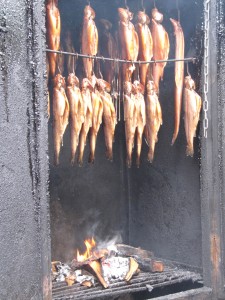
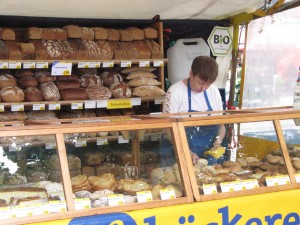
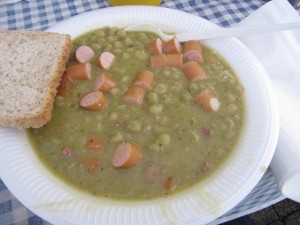
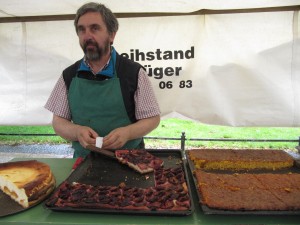
In early summer, native strawberries are everywhere, even at train stations. “They are so aromatic and glow with freshness, I can eat an entire container in a day,” she writes.
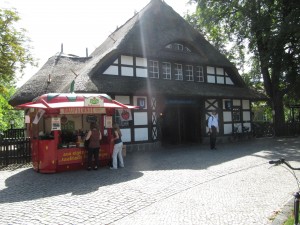
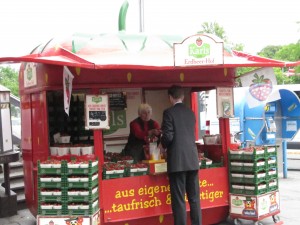
Winters she anticipates Christmas goose, which she considers “a pain in the neck to prepare, but so worth it when you are tucking into the dark rich flesh and wonderful gravy.”
Berlin’s food scene has expanded dramatically since Weiss’s childhood. The city’s large Turkish population brought doner kebabs, spicy meat wrapped in flatbread; another wildly popular dish is currywurst, grilled franks slathered in a ketchup-like sauce with curry.
Both are sold at outdoor stands. Berlin food, says Weiss, “has become far more international than it once was and there are far more places to eat, from the casual to the very fancy.” Still, she adores currywurst.
Hugo begins to stir, looking for sustenance. No currywurst for this boy and his mother won’t need to budge from the sofa. She seems content as she prepares to feed him.
Read Luisa Weiss’s blog at www.thewednesdaychef.com. She will sign books on Oct. 2 at 7 p.m. at the Harvard Bookstore, 1256 Massachusetts Ave., Cambridge, 617-661-1515.

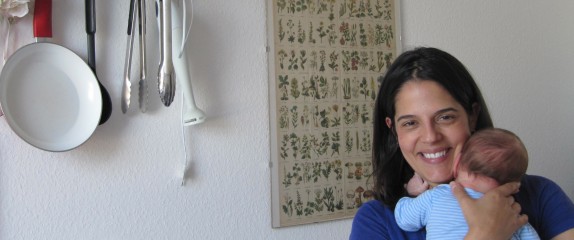
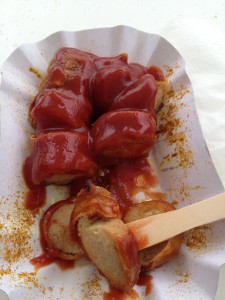









 Debra Samuels, bestselling author, food writer and cooking instructor,
Debra Samuels, bestselling author, food writer and cooking instructor, 



What a great discussion of Luisa’s book – how wonderful that you were able to visit her kitchen! I had the pleasure of meeting her at her reading at the Harvard Book Store last week.